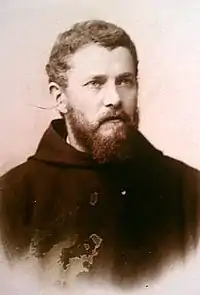Gregory Gerrer
Rev. Gregory Gerrer, OSB (July 23, 1867 – August 24, 1946) was a Benedictine Priest at Sacred Heart Abbey (later, St. Gregory's Abbey), artist, art historian and museum founder.[1]
Rev. Gregory Gerrer, OSB | |
|---|---|
 | |
| Born | July 23, 1867 Lautenbach, Alsace |
| Died | August 24, 1946 (aged 79) Oklahoma |
| Other names | Robert Francis Xavier Gerrer |
| Education | Sacred Heart College |
| Church | Roman Catholic Church |
| Ordained | September 19, 1900 at Buckfast Abbey |
Offices held | Founder and Director, St. Gregory’s Museum and Art Gallery |
Art career
From 1900 to 1904, Gerrer studied art in Rome. Shortly after the election of Pope Pius X, Gerrer participated in a competition of artists to paint the official portrait of the new pope.[2] When Pius saw the finished portrait by Gerrer, he selected it to be his portrait. Pius said that he choose it because the artist painted the him true to life and did not minimize his facial warts.
Gerrer also painted portraits of two World War I Choctaw code talkers, Otis Leader and Joseph Oklahombi.[3]
The largest collection of his paintings are at the Mabee-Gerrer Museum of Art in Shawnee, Oklahoma. His work is also in the Vatican art collection, Rome, Snite Museum of Art in South Bend, Indiana, and Fred Jones Jr. Museum of Art in Norman, Oklahoma.
Gerrer was a co-founder and first president of the Association of Oklahoma Artists.
Notable Portraits
- Pope Pius X
- Joseph Oklahombi
- Otis Leader
- John Benjamin Murphy[4]
Honors
Gerrer was inducted into the Oklahoma Hall of Fame in 1931.
The University of Notre Dame conferred an honorary Doctor of Laws degree to Gerrer.
References
- "Mabee-Gerrer Museum of Art". About Father Gregory. Retrieved 29 November 2011.
- "Encyclopedia of Oklahoma History and Culture". Gerrer, Gregory. Retrieved 29 November 2011.
- Murphey, Joseph (1874). Tenacious Monks. St. Gregory's Abbey, Shawnee, OK: Benedictine Color Press. pp. 422–425.
- Gerrer, Gregory. Catalogue of the Whitman Memorial Art Gallery. Notre Dame, Indiana: University of Notre Dame. pp. 19, 20.
